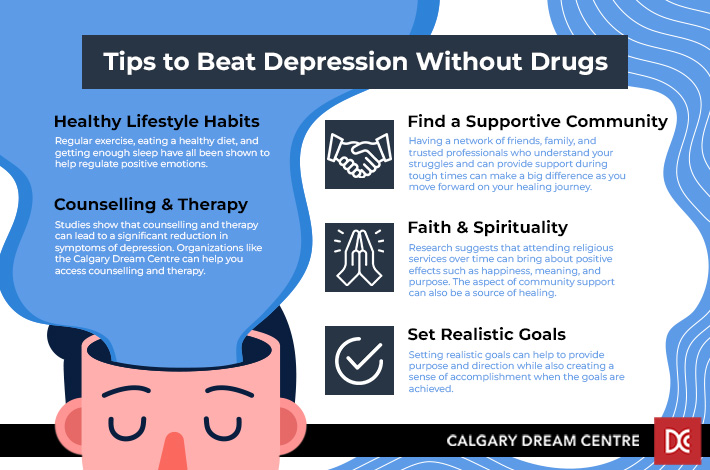Depression is a common obstacle for people recovering from addiction. Whether it’s a result of underlying mental health issues or a byproduct of the addiction and recovery process itself, feelings of sadness and hopelessness can often be overwhelming.
While medication is frequently used to manage depression symptoms, it’s important to recognize that there are other ways to combat depression. There is hope for those who are struggling, and through various non-pharmaceutical techniques, it’s possible to live a fulfilling and depression-free life.
Some of the most effective ways to fight depression without drugs include healthy lifestyle changes, reaching out for community support, exploring counselling or therapy, and practicing your faith or spirituality. By taking a holistic approach to recovery, we can work toward a brighter, more promising future.
What Happens to Your Brain When You’re Depressed?
Depression can take a significant toll on a person emotionally. Feelings of sadness, hopelessness, and numbness can be overwhelming, making it difficult to enjoy life or engage in activities that were once pleasurable. But what’s going on beneath the surface when we experience depression?
Depression can change the chemistry of our brains, altering the way that we think, feel, and behave. Hormonal changes can also impact the growth of brain cells, contributing to the physical effects of depression.
Symptoms of Depression
Depression can be a challenging condition to navigate, but by recognizing its symptoms, you can take steps toward finding the help and support you need.
Some common symptoms of depression include:
- Persistent sad, anxious, or “empty” mood
- Feelings of hopelessness or pessimism
- Feelings of irritability, frustration, or restlessness
- Feelings of guilt, worthlessness, or helplessness
- Decreased energy, fatigue, or feeling slowed down
- Thoughts of death or suicide or suicide attempts
Risk Factors
Many of the same risk factors that can contribute to addiction can also put individuals at risk of developing depression. For example, the stress of starting new routines, meeting new people, and following through on a recovery plan can be overwhelming.
Here are some common risk factors for depression:
- Family history and genetics
- Chronic stress
- History of trauma
- Poor nutrition
- Unresolved grief or loss
Common Treatments
There are several effective treatments available for depression, and finding the right treatment for you may take some time and experimentation.
For mild depression, often a wait-and-see approach is taken as mild to moderate depression can be short-term and may resolve on its own. In such cases, medication is unlikely to be helpful, but it’s important to monitor your mood to take appropriate action if you notice a change.
For more severe or recurring depression, psychological treatments such as counselling or therapy can be very helpful. For some individuals, antidepressant medication is an option, as well as herbal remedies.
Factors such as lifestyle and risk factors—such as homelessness—can make an impact on how long depression lasts and how difficult it is to recover from it. With a compassionate treatment plan, it is possible to overcome depression and regain balance and peace in one’s life.

How to Improve Your Mood Without Drugs
Depression is treatable, and there are many options available beyond medication.
Exercise, psychotherapy, counselling, and support groups can all be powerful tools in improving mood and overall well-being. Working with a mental health professional can help identify the best course of treatment for your individual situation.
Exercise & Healthy Habits
Regular physical activity has been shown to release endorphins—hormones that regulate positive emotions. Eating a healthy diet also helps to maintain good mental health by providing the body with essential nutrients. Other healthy habits, such as sleeping well, reducing stress, and socializing with friends, can help ease the symptoms of depression in many cases.
Building a Supportive Community
Having a network of friends, family, and trusted professionals who understand your struggles and can provide support during tough times can make a big difference. Organizations like the Calgary Dream Centre are committed to helping individuals with mental health issues by providing access to resources and education as well as providing support for those who need it.
Counselling & Therapy
Studies have shown that counselling and therapy can lead to a significant reduction in symptoms of depression. It’s important to have access to professional guidance when confronting mental health issues, and organizations like the Calgary Dream Centre are committed to helping people get the counselling and therapy they need. The goal of these services is to not only help you cope with depression but also develop the tools necessary to succeed in your recovery journey.

Faith & Spirituality
Becoming part of a supportive faith community, having strong relationships with those within it, can be an invaluable tool in coping with depression. Research suggests that attending religious services over time can bring about positive effects such as happiness, meaning, and purpose. Additionally, prayer has been found to have a significant impact on the mental health of people dealing with depression and anxiety.
Set Realistic Goals
Setting realistic goals can help to provide purpose and direction while also creating a sense of accomplishment when the goals are achieved. When setting these goals, it’s important to choose goals that are achievable and within reach. This can help to prevent feelings of discouragement or failure from arising. By providing tangible results along the journey, individuals suffering from depression may have a better chance at finding healing and moving forward with their lives.
Find a Sense of Community & Healing
Treating depression doesn’t have to involve drugs or medication. At Calgary Dream Centre, we provide individuals struggling with depression comprehensive programs that support them on their path to recovery.



